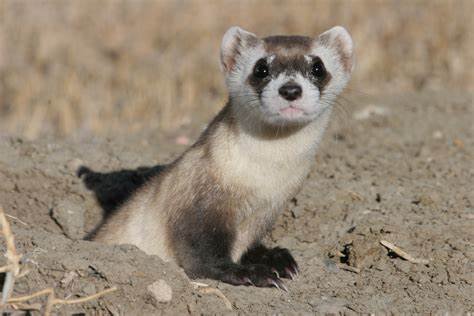Scientists Clone Endangered U.S. Animal for the First Time

The endangered black-footed ferret was cloned using cells from an ancestor that lived more than three decades ago.
Scientists have successfully cloned an endangered U.S. animal for the first time, creating a black-footed ferret from the frozen cells of an ancestor.
The U.S. Fish and Wildlife Service announced Friday that the cloned ferret, Elizabeth Ann, was cloned from the cells of another black-footed ferret, Willa, that lived more than three decades ago. She was among the last wild black-footed ferrets and her genes and tissue samples were sent to the San Diego Zoo Global's Frozen Zoo in 1988 after her capture.
In 2018, the service issued its first-ever permit for cloning research of an endangered species and embryos were created from Willa's cells and implanted into a domestic ferret surrogate. Elizabeth Ann was born Dec. 10.
According to the service, the black-footed ferret is one of North America's rarest land animals and is native to the Great Plains. However, it faces a variety of threats, including habitat loss and disease, which scientists hope cloning could relieve. Without enough genetic diversity, a species often becomes more susceptible to disease and genetic abnormalities.
The Wildlife Service is working with scientists at Revive & Restore, ViaGen Pets, San Diego Zoo Global and the Association of Zoos and Aquariums to increase genetic diversity and disease resistance.
Noreen Walsh, director of the service's Mountain-Prairie Region, said in the release that they are working to "overcome genetic limitations hampering recovery of the black-footed ferret."
"Although this research is preliminary, it is the first cloning of a native endangered species in North America and it provides a promising tool for continued efforts to conserve the black-footed ferret," Walsh said in a press release.
The Fish and Wildlife Service called genetic cloning a tool to pave the way to conserve endangered and threatened species "by supplementing traditional and proven measures such as habitat protection, captive breeding, disease control, invasive species management and wild population surveys."
It said the birth of the cloned ferret could help address genetic barriers many wildlife species face and hopes to increase the chances of wild black-footed ferrets becoming self-sustaining in the future.
Elizabeth Ann will not be released into the wild and will be cared for at the service's Black Footed Ferret Conservation Center in Colorado.